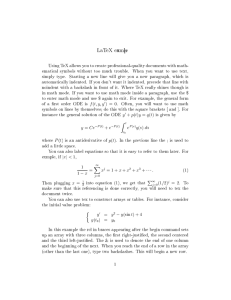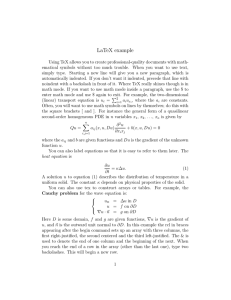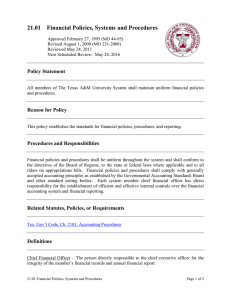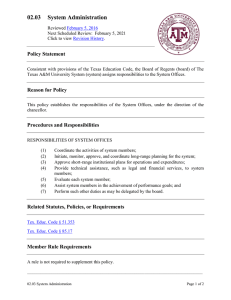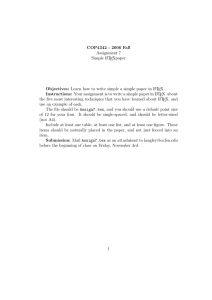T FAMILY LAW by
advertisement
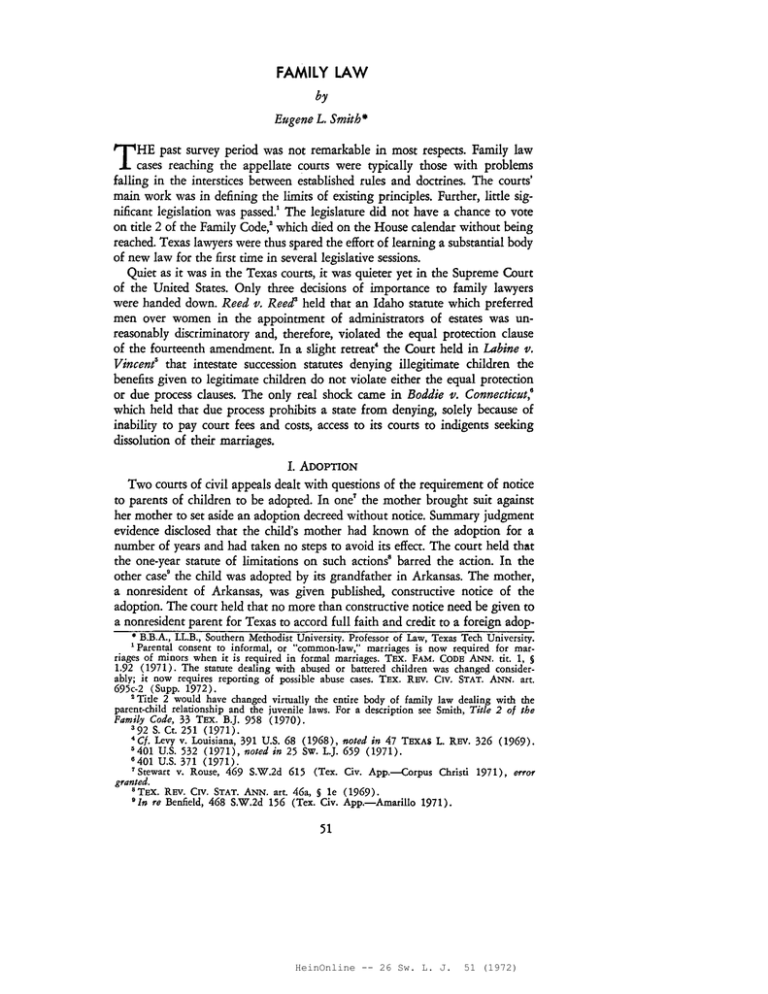
FAMILY LAW by Eugene L. Smith· T HE past survey period was not remarkable in most respects. Family law cases reaching the appellate courts were typically those with problems falling in the interstices between established rules and doctrines. The courts' main work was in defining the limits of existing principles. Further, little significant legislation was passed! The legislature did not have a chance to vote on title 2 of the Family Code,' which died on the House calendar without being reached. Texas lawyers were thus spared the effort of learning a substantial body of new law for the first time in several legislative sessions. Quiet as it was in the Texas courts, it was quieter yet in the Supreme Court of the United States. Only three decisions of importance to family lawyers were handed down. Reed v. Reeri' held that an Idaho statute which preferred men over women in the appointment of administrators of estates was unreasonably discriminatory and, therefore, violated the equal protection clause of the fourteenth amendment. In a slight retreat4 the Court held in Labine v. Vincenl that intestate succession statutes denying illegitimate children the benefits given to legitimate children do not violate either the equal protection or due process clauses. The only real shock came in Boddie v. Connecticut,S which held that due process prohibits a state from denying, solely because of inability to pay court fees and costs, access to its courts to indigents seeking dissolution of their marriages. I. ADOPTION Two coutts of civil appeals dealt with questions of the requirement of notice to parents of children to be adopted. In one' the mother brought suit against her mother to set aside an adoption decreed without notice. Summary judgment evidence disclosed that the child's mother had known of the adoption for a number of years and had taken no steps to avoid its effect. The court held that the one-year statute of limitations on such actionsS barred the action. In the other cases the child was adopted by its grandfather in Arkansas. The mother, a nonresident of Arkansas, was given published, constructive notice of the adoption. The court held that no more than constructive notice need be given to a nonresident parent for Texas to accord full faith and credit to a foreign adop• B.B.A., LL.B., Southern Methodist University. Professor of Law, Texas Tech University. Parental consent to informal, or "common-law," marriages is now required for marriages of minors when it is required in formal marriages. TEX. FAM. CODE ANN. tit. 1, § 1.92 (1971). The statute dealing with abused or battered children was changed considerably; it now requires reporting of possible abuse cases. TEX. REV. CIv. STAT. ANN. art. 695c-2 (Supp. 1972). 2 Tide 2 would have changed virtually the entire body of family law dealing with the parent-child relationship and the juvenile laws. For a description see Smith, Title 2 of the Family Code, 33 TEX. B.]. 958 (1970). 392 S. Ct. 251 (1971). 4Cf. Levy v. Louisiana, 391 U.S. 68 (1968), noted in 47 TEXAS L. REV. 326 (1969). 5401 U.S. 532 (1971), noted in 25 Sw. L.]. 659 (1971). s401 U.S. 371 (1971). 7 Stewart v. Rouse, 469 S.W.2d 615 (Tex. Civ. App.-Corpus Christi 1971), en'or granted. 8 TEX. REV. CIv. STAT. ANN. art. 46a, § Ie (1969). SIn re Benfield, 468 S.W.2d 156 (Tex. Civ. App.-Amarillo 1971). 1 51 HeinOnline -- 26 Sw. L. J. 51 (1972) 52 SOUTHWESTERN LAW JOURNAL [Vol. 26 tion decree. This decision is defensible only if the proof established that the mother's whereabouts was unknown and unascertainable. tO The right of a life tenant's adopted child to take as a remainderman under a trust instrument that makes a class gift to "children" of the life tenant was again before the courts." Two inter vivos trusts were established in 1952 by the life tenant's parents, Mr. and Mrs. Grady Vaughn, Sr. At the time the trusts were created the life tenant, Vaughn, Jr., had a ten-year-old son, Grady Vaughn, III. Three years later the trustor died. Subsequent to his death Vaughn, Jr., and his wife adopted a son, Gary William. After the death of Vaughn, Jr., in 1967 the trustees instituted a declaratory judgment proceeding to determine whether both the adopted and natural sons were entitled to benefits under the trusts as "children" of the life tenant. Upon appeal from a trial court judgment that Gary William was entitled to share equally with Grady, III, the court of civil appeals affirmed, relying principally upon section 9 of article 46a, which equates adopted children with legitimate children and provides that "such adopted child shall be regarded as a child of the parent (or parents) by adoption for all other purposes as well, except that where a deed, will, or other instrument uses words clearly intended to exclude children by adoption, such adopted child shall not be included in such class."" This provision, adopted in 1951, was held by the court to create a rule of construction requiring the inclusion of adopted children in class gifts to "children" made after its enactment unless a contrary intent is shown in the language of the instrument. Two earlier supreme court casest3 (one involving the same family) were distinguished on the ground that the words used in both the instruments there involved indicated an intention to exclude adopted children. The court seems clearly correct in the conclusion it reached. The trust instruments involved were executed after the 1951 amendment to the adoption statute, and it is clearly correct to hold that the law in effect at the time of execution should control for purposes of definition of class. II. CUSTODY AND SUPPORT In Meucci v. Meuccr the supreme court put teeth in the Bukovich doctrine,t5 which gives res judicata effect to custody orders entered by sister states. The Meuccis were divorced in Illinois in September 1969. Temporary custody of the children had been awarded to the father in a preliminary hearing in June; in the same hearing the mother had been enjoined from removing the children from Illinois. In violation of the court order, she took the children to Taylor County, Texas, in July. The final judgment of divorce ordered her to return the children to the father and to litigate custody only in the Illinois courts. The father then came to Texas and filed an application for writ of habeas corpus, to See Mullane v. Central Hanover Bank & Trust Co., 339 U.S. 306 (1950); ct. May v. Anderson, 345 U.S. 528 (953). 11 Vaughn v. Gunter, 458 S.W.2d 523 (Tex. Civ. App.-Dallas 1970). "TEX. REV. ClV. STAT. ANN. art. 46a, § 9 (1969). taCutrer v. Cutrer, 162 Tex. 166, 345 S.W.2d 513 (1961); Vaughn v. Vaughn, 161 Tex. 104, 337 S.W.2d 793 (1960). 14 457 S.W.2d 48 (Tex. 1970). t~ Bukovich v. Bukovich, 399 S.W.2d 528 (Tex. 1966). HeinOnline -- 26 Sw. L. J. 52 (1972) 1972] FAMILY LAW 53 relying on the Illinois judgment. In October a Taylor County jury found a material change of conditions since the June decree, and the trial judge gave custody to the mother. In a per curiam opinion the supreme court held that there was no evidence of a change of conditions despite testimony that the mother was emotionally and mentally stable since moving to Texas in July. Perhaps indicating their impatience with interstate flight and violation of custody decrees, the court tersely ordered the trial judge to issue a warrant for attachment of the children, to turn the children over to the father, and as a final fillip denied the parties the right of filing a motion for rehearing. Whether the rule is founded on the doctrine of comity'· or that of full faith and credit, the court makes plain that sister state decrees awarding custody will be given the same effect as Texas decrees, merging all issues relating to the circumstances of custody as of the time of the decree. Strange v. Strange'7 dealt with the opposite situation-a defendant who fled Texas during a pending divorce suit and took the parties' child in violation of a temporary order. The supreme court's opinion gave short shrift to the arguments that the trial court was without jurisdiction to determine custody, saying that until the suit is formally terminated by dismissal, "the court necessarily retains its previously acquired jurisdiction to determine ... issues raised by the parties, including any question of custody."'· Perhaps the most important case in the survey period was G. v. P.,19 which held that the father of an illegitimate child has no liability under Texas law to support the child, and that denial of the right of suPPOrt does not violate the equal protection clause of the fourteenth amendment. The majority opinion held, in keeping with Texas authority:o that absent a legitimation or paternity statute no duty exists on the part of the father to support his illegitimate child. Remarkably, this case presented a clear issue on the constitutionality of the Texas rule because the trial court found that the defendant was the father of the child. The Supreme Court'S refusal to review the decision of the court of civil appeals indicates that no Texas court will hold Texas denial of support to illegitimate children unconstitutional, leaving it to the legislature:' or the federal courts,22 to remedy the deficiency. ,. See McElreath v. McElreath, 162 Tex. 190, 345 S.W.2d 722 (1961), enforcing an Oklahoma divorce decree as a matter of comity even though it affected title to land in Texas. 17 464 S.W.2d 364 (Tex. 1971). ,. [d. at 367. The Texas idea of continuing jurisdiction over nonresidents was further applied in Davi v. Davi, 456 S.W.2d 238 (Tex. Civ. App.-Texarkana 1970), error dismissed, holding that a divorce court had power to modify a support order even though the obligor had become a nonresident. Ordinarily the obligee is left to his remedy under the Uniform Reciprocal Enforcement of Support Act, TEX. REV. CIv. STAT. ANN. art. 2328b-4 (1971), in those circumstances, because a sister state does not have to give full faith and credit to an increase in a support order if there was no personal jurisdiction of the obligor. See Yarborough v. Yarborough, 290 U.S. 202 (1933). '9466 S.W.2d 41 (Tex. Civ. App.-San Antonio 1971), error ref. n.r.e.; accord, Wells v. Hames, 464 S.W.2d 393 (Tex. Civ. App.-Houston [14th Dist.] 1971), error ref. n.r.e. 20 Home of Holy Infancy v. Kaska, 397 S.W.2d 208 (Tex. 1965) (dictum); Lane v. Phillips, 69 Tex. 240, 6 S.W. 610 (1887). 2' The majority opinion noted that the Family Law Section of the State Bar of Texas presented a paternity act in the last session of the legislature. S.B. 281, 61st Tex. Leg., Reg. Sess. (1971). 22 A three-judge federal court sitting in Dallas upheld the constitutionality of Texas' denial of paternal support to illegitimates. S. v. D., Civil No. 3-4336-D (N.D. Tex., Nov. HeinOnline -- 26 Sw. L. J. 53 (1972) 54 SOUTHWESTERN LAW JOURNAL [Vol. 26 A court of civil appeals held in another case worthy of note that in a suit for change of custody the first court in which suit is filed has exclusive jurisdiction to proceed with the matter, thus depriving other courts of jurisdiction over the subject matter in questions of custody.23 Any judgment rendered by the second court would thus be void, even without a plea in abatement or other objection to the second court's jurisdiction. Despite the doubtful correctness of the decision, by following it courts would eliminate the multicourt litigation that is presently possible and which makes difficult the determination of parental rights. However, the supreme court has granted writ of error in the case and will undoubtedly reverse on this point. A relatively rare case dealing with the parents' obligation of support for a child's necessaries was decided. 24 Emergency dental treatment and follow-up work was performed pursuant to a contract with the child's divorced mother. The dentist sued the father for dental fees, claiming they were for necessaries furnished the child. The father defended on the theory that the divorce court's child support order was the extent of his obligation to his child. Upholding a trial court judgment for the dentist, the appellate court held that the divorce decree and support order did not limit the father's obligation for necessaries furnished to his minor child, and that a right to recovery was established by proof that the services were reasonable and necessary, related to the child's health and welfare, and were the customary charges for such work. III. MARRIAGE, DIVORCE, AND ANNULMENT Amazingly, in the past year no cases of any significance, or even interest, were decided on the questions of marriage and annulment. Two hitherto unanswered questions under the Family Code were resolved by courts of civil appeals. In Prewitt v. Prewitt'Cl the husband was awarded a divorce and custody of the parties' child by the jury on his counterclaim. The jury also found that the wife was not entitled to attorney's fees incurred in the divorce proceeding. There was little, if any, property to be divided between the parties. The trial court disregarded the jury finding and awarded the wife's attorney a fee stipulated to be reasonable. The court of civil appeals affirmed, holding that attorney's fees incurred by a wife in a divorce suit are a "necessity" if she had reasonable ground for bringing the suit and brought it in good faith. Thus, even though she lost all issues, the debt was one that could be charged against the husband by the trial judge in the exercise of his discretion. Authority for the allocation of this debt to the husband apparently is found in section 3.63 of the Family Code,~ although the opinion of the court did not cite statutory authority for its holding. I, 1971). An appeal of this decision to the Supreme Court of the United States will be made. 23 Kohls v. Kohls, 461 S.W.2d 455 (Tex. Civ. App.-Corpus Christi 1970), error ref. n.r.e. .. Lawrence v. Cox, 464 S.W.2d 674 (Tex. Civ. App.-Waco 1971). 23 459 S.W.2d 720 (Tex. Civ. App.-Tyler 1970). 26 TEX. FAM. CODE ANN. tit. 1, § 3.63 (l971) empowers the trial court to divide the parties' property equitably. Charging debts of the community against one or the other spouse now seems to be a division of "negative" property and within the power of the court. HeinOnline -- 26 Sw. L. J. 54 (1972) 1972] FAMILY LAW 55 A second, and perhaps minor point was decided in Harvel v. Harvel." There the husband sued for divorce on the alternative grounds of insupportability and cruel treatment. His wife alleged as a defense the common-law defense of adultery on his part. This defense had existed prior to the enactment of article 4630, which stated that a spouse's adultery barred a divorce suit, but was repealed by the legislature when it enacted the Family Code in 1969.211 Attorneys had questioned whether the repeal of the statute and the failure of the Code expressly to abolish adultery as a defense left standing the common-law defense:· The court held (apparently) that the abolition of recrimination as a defense by section 3.08 of the Code had the effect of abolishing adultery as a defense as well. Although the opinion is not wholly satisfactory because of its failure to discuss the question fully, it will probably be followed. Most of the divorce cases during the survey period dealt with problems attending division of property upon divorce. Appellate courts have long accorded trial courts the broadest possible powers to divide the community and separate 30 property of the spouses upon divorce under section 3.63 of the Family Code 31 and its predecessor, article 4638. Reviewing courts must find a division of property "manifestly unjust and unfair" on the whole record before setting aside a trial court order. The extent of this power was indicated by a civil appeals decision32 affirming a trial court judgment giving the wife only $277,000 out of a community estate of $1,134,000, a ratio of approximately three to one in favor of the husband. The court said that the wife's burden on appeal was to establish that there was no rational basis for the trial court division--a diffi· cult, if not impossible, burden to bear. Many lawyers are fearful of exposing their clients, whether male or female, to a judicial division of property that is virtually irreversible. This faeror, combined with the difficulty of getting to trial on dockets that are jammed with other divorce cases, has resulted in the common practice of negotiating the terms of divorce and incorporating these terms in an agreement that is approved and adopted by the divorce court. Further, any lawyer who has participated in divorce cases (particularly in metropolitian areas) is aware that considerable pressure is exerted upon the parties to reach agreement to conserve judicial time. These agreements usually include provisions for division of property, support of children, custody, visitation, and contractual alimony for the wife. 33 The courts are still working out rules governing these agreements, as they are a phenomenon of only the last five years. Cases that came before the ap· pellate courts during the survey period indicate that lawyers should be cautious 27 466 S.W.2d 39 (Tex. Civ. App.-Houston [1st Dist.] 1971). 28 Ch. 888, § 6, [1969] Tex. Laws 2707. 29 McKnight & Raggio, Family Law, A1lnual Survey of Texas Law, 25 SW. 1.J. 34, 36·37 (1971). 3U TEX. FAM. CODE ANN. tit. 1, § 3.63 (1971) authorizes division of all property, whether real or personal, or separate or community, as the divorce court finds "just and right." 3'TEX. REV. CIV. STAT. ANN. art. 4638 (1960), as amended, TEX. FAM. CODE ANN. tit. 1, § 3.63 (1971). 32Dorfman v. Dorfman, 457 S.W.2d 417 (Tex. Civ. App.-Texarkana 1970). 33 For a discussion of the early development of this body of law see Smith, Family Law, Annual Survey of Texas Law, 22 SW. 1.J. 115, 122·28 (1968). HeinOnline -- 26 Sw. L. J. 55 (1972) 56 SOUTHWESTERN LAW JOURNAL [Vol. 26 in their drafting of such agreements, since a number of suits to set them aside were successfully brought. Careless representation in drafting or approving such instruments may substantially harm a client. A series of warnings suggested by this year's cases should be kept in mind. (1) When are They Binding? A court held that agreements in contemplation of divorce or permanent separation are not binding until the agreement is approved by the divorce court, because the division of property on divorce is addressed to that court's discretion.34 A corollary of this principle is that any such agreement has no effect upon the right of creditors of the community to assert an interest in the property supposedly divided.35 The moral: Lawyers entering into such agreements should include indemnity provisions covering the period between execution of the agreement and the approval by the divorce court, or else run the risk that property set aside to their clients will be subject to the claims of creditors of the other spouse. A provision should also be included for judicial ratification of an agreement providing for changes in the status of property in the interim between execution of the agreement and court approval. For example, any income earned during that period should clearly be covered in the final decree. (2) Property Division or Child Support? The agreement should make plain whether property allocated to a spouse is part of a property division or is to be considered a portion of child support. One significance of this distinction is that property settlement agreements are contractually enforceable36 and not subject to the continuing jurisdiction of the court,37 whereas decretal provisions for the support of children are subject to such jurisdiction and can be subsequently altered.88 Thus, if the agreement sets aside property to a spouse to be used in the support of minor children, changed conditions will not justify a change in that agreement;3" the only remedy available is a suit to rescind or reform the contract under the general principles governing contracts. (3) Necessity of Full Disclosure. The spouses must make full disclosure of the nature and extent of the community estate under their control or the property settlement agreement may be set aside on the ground of fraud in a subsequent suit. The husband in a recent case was said to stand in a semifiduciary relationship with his wife, placing upon him the duty of full disclosure of 34 Amarillo Nat'l Bank v. Liston, 464 S.W.2d 395 (Tex. Civ. App.-Amarillo 1970), error ref. n.r.e. The majority opinion stated that the agteement could not be an enforceable division of property even though in contemplation of permanent separation because statutory partition and gift are the exclusive methods of changing community into separate property during marriage. This was probably dictum, but if accepted on its face, would be contrary to a long line of Texas authority recognizing the viability of such separation agreements. Id. at 409-10 (dissenting opinion). The overbroad statement is unfortunate because it casts a cloud upon the spouses' rights inter se, and the case was concerned with creditors' rights. Contra, Harding v. Harding, 461 S.W.2d 235 (Tex. Civ. App.-San Antonio 1970) (dicrum; states that such agreements are valid if fair and equitable). 35 Amarillo Nat'l Bank v. Liston, 464 S.W.2d 395 (Tex. Civ. App.-Amarillo 1970), error ref. n.r.e. 36 Francis v. Francis, 412 S.W.2d 29 (Tex. 1967). 37 Martinez v. Guajardo, 464 S.W.2d 944 (Tex. Civ. App.-San Antonio 1971); Ex parte Duncan, 462 S.W.2d 336 (Tex. Civ. App.-Houston [1st Dist.] 1970) (failure to perform agreement not punishable by contempt). 38 TEX. REV. CIv. STAT. ANN. art. 4639a (Supp. 1972); cf. Hutchings v. Bates, 406 S.W.2d 419 (Tex. 1966); see Smith, supra note 33, at 125-27. 39 Martinez v. Guajardo, 464 S.W.2d 944 (Tex. Civ. App.-San Antonio 1971). HeinOnline -- 26 Sw. L. J. 56 (1972) 1972} FAMILY LAW 57 assets of the community (and presumably separate) estates that are disposed of by the property settlement agreement. 40 Failure to do so vitiated the transaction and made it possible for the wife subsequently to sue for an undivided onehalf of property not disclosed or, in the alternative, for damages for concealment of debts chargeable against the share allocated to her and for reducing her share. In addition, the property settlement agreement is not binding on the divorce court unless it is "fair and equitable," and, thus, may be disapproved. 41 (4) Venue Considerations. Careful lawyers will insert provisions for the place of performance of these property settlement agreements. Because they are enforceable as contracts, property settlement agreements are governed by sub· division 5 of article 1995, providing that venue may lie in the county in which the contracts are to be performed. 42 Failure to insert such a venue provision may result in an undesirable forum if suit is brought to enforce the agreement. (5) Method of Enforcement. With careful drafting, enforcement of property settlement agreements perhaps may be either by suits founded on contract or by contempt proceedings for failure to abide by the terms of the settlement agreement. A proper rule would seem to be that court-"ordered" contractual alimony would be enforceable by contempt in the same fashion as a division of property under section 3.63 of the Family Code.43 In representing the obligee, a lawyer should take every step to insure that his client has the fullest range of enforcement devices available. A direct court order directed to the obligor, requiring him to make the payments provided in the property settlement agreement, should suffice. 44 ( 6) Execution. The attorney should be certain that steps are taken to effectuate any property settlement agreement approved by a court. By way of example, if either party has relinquished a community property interest in assets disposed of by the property settlement agreement, all instruments necessary to effectuate the allocation should be executed. A common example would obviously be directing a husband to execute a change of beneficiary form on a life insurance policy set aside to him,45 or executing deeds necessary to transfer title. (7) Court Approval. Agreements for custody of children and for their support are always subject to judicial approval. Existing Texas law requires that the court specifically rule upon these two matters.46 (8) Consideration. Consideration is not a major problem when contractual alimony is to be provided. Courts have held that periodic payments to a wife provided in a property settlement agreement need not be referable to any speDudley v. Lawler, 468 S.W.2d 160 (Tex. Civ. App.-Waco 1971). Amarillo Nat'l Bank v. Liston, 464 S.W.2d 395 (Tex. Civ. App.-Amarillo 1970), error ref. n.r.e.; Harding v. Harding, 461 S.W.2d 235 (Tex. Civ. App.-San Antonio 1970). 42 Brasfield v. Brasfield, 466 S.W.2d 368 (Tex. Civ. App.-Houston [1st Dist.] 1971), error dismissed. 43 Ex parte Latham, 47 Tex. Crim. 208, 82 S.W. 1046 (1904). 44 But see Ex parte Duncan, 462 S.W.2d 336 (Tex. Civ. App.-Houston [Ist Dist.] 1970) (dictum that enforcement by contempt would be unconstitutional imprisonment for debt) . 45 Partin v. deCordova, 464 S.W.2d 956 (Tex. Civ. App.-Eastland 1971), error ref. (wife entitled to insurance proceeds when husband did not change beneficiary, even though she surrendered her interest in property settlement agreement). 46 See Kohls v. Kohls, 461 S.W.2d 455 (Tex. Civ. App.-Corpus Christi 1970), error granted on other grounds. 40 41 HeinOnline -- 26 Sw. L. J. 57 (1972) 58 SOUTHWESTERN LAW JOURNAL [Vol. 26 cific property of the spouses:7 Because Texas courts are given great discretion in the division of property,48 the parties themselves may exercise similar discretion and the courts will enforce the agreement they reach.49 IV. INTRAFAMILY IMMUNITY Intrafamily immunity was struck a blow in FelderhofJ v.. FelderhofJ,GO in which the supreme court held that a child could sue his parent for personal injuries sustained as a result of conduct of the parent not arising out of his discharge of parental duties. Doubtless the doctrine of intrafamily immunityu and its brother, the community propertyG2 defense, are on their way out. 47 Miller v. Miller, 463 S.W.2d 477 (Tex. Civ. App.-Tyler 1971), error ref. n.r.e. (court apparently approved wife's description of the consideration for a husband's promise as "'a gal twenty-two years younger than he' and the right to remarry,") ld. at 480. 48 See text accompanying note 31 supra. 49 This statement is subject to the limitations described in text accompanying notes 39·41 supra. $0473 S.W.2d 928 (Tex. 1971). 51 The supreme court lost an opportunity to determine the issue of a father's right to sue his unemanopated minor child for damages caused by the child's negligence in Wallace v. Wallace, 466 S.W.2d 416 (Tex. Civ. App.-Eastland), judgment set aside and remanded for settlement per stipulation, 15 Tex. Sup. Ct. ]. 58 (1971). G2 Cf. Smith v. Smith, 473 S.W.2d 299 (Tex. Civ. App.-Texarkana 1971). HeinOnline -- 26 Sw. L. J. 58 (1972)

